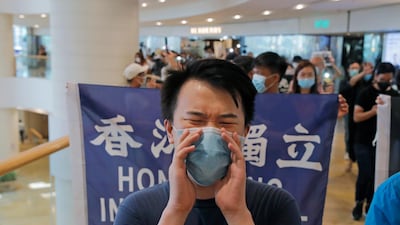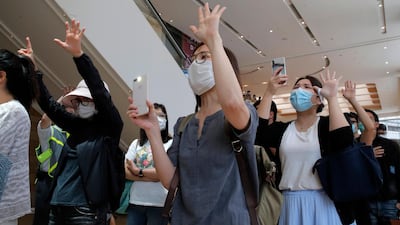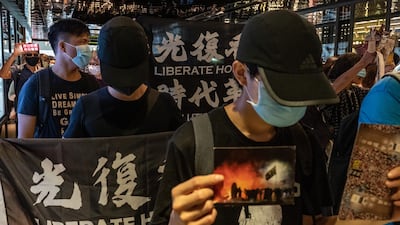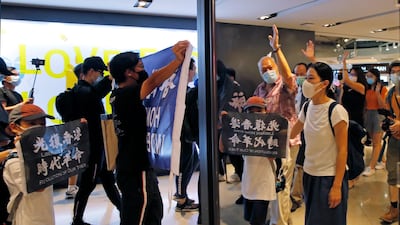Hong Kong police made the first arrests under Beijing's new national security law on Wednesday as the anniversary of the city's handover to China was met by thousands defying a ban on protests.
Police deployed water cannon, pepper spray and tear gas throughout the afternoon, arresting more than 180 people, seven of them for breaching the new national security law.
The confrontations came a day after China imposed its controversial legislation on the restless city, a historic move decried by many Western governments as an unprecedented assault on the finance hub's liberties and autonomy.
Beijing said the law would restore stability. But its imposition sparked the worst unrest in months.
A man found in possession of a Hong Kong independence flag became the first person to be arrested under the law, police said on Wednesday.
"A man was arrested for holding a #HKIndependence flag in #CausewayBay, Hong Kong, violating the #NationalSecurityLaw," police wrote on their Twitter account, alongside a picture of the man and the flag.
"This is the first arrest made since the law has come into force."
The law makes secessionist, subversive or terrorist activities illegal, as well as foreign intervention in the city's internal affairs. It was imposed by China after months of anti-government protests in the semi-autonomous territory last year.
Hong Kong police also used water cannon to disperse activists protesting against Beijing's new national security legislation.
City leader Carrie Lam strongly endorsed the law in her speech marking Wednesday's anniversary of Hong Kong's handover from colonial Britain.
"This decision was necessary and timely to maintain Hong Kong's stability," she said after a flag-raising ceremony.
A pro-democracy political party, The League of Social Democrats, organised a protest march during the flag-raising. About a dozen participants chanted slogans echoing demands from protesters last year for political reform and an investigation into accusation of police abuse.
The law's passage on Tuesday further blurs the distinction between the legal systems of semi-autonomous Hong Kong, which maintained aspects of British law after the 1997 handover, and the mainland's system. Critics say the law effectively ends the "one country, two systems" framework under which Hong Kong was promised a high degree of autonomy.
The law directly targets some of the actions of anti-government protesters last year, which included attacks on government offices and police stations, damage to subway stations and the shutdown of the city's international airport.
Acts of vandalism against government facilities or public transit can be prosecuted as subversion or terrorism, while anyone taking part in activities deemed as secessionist would also be in breach of the new law.
How does ToTok work?
The calling app is available to download on Google Play and Apple App Store
To successfully install ToTok, users are asked to enter their phone number and then create a nickname.
The app then gives users the option add their existing phone contacts, allowing them to immediately contact people also using the application by video or voice call or via message.
Users can also invite other contacts to download ToTok to allow them to make contact through the app.
2025 Fifa Club World Cup groups
Group A: Palmeiras, Porto, Al Ahly, Inter Miami.
Group B: Paris Saint-Germain, Atletico Madrid, Botafogo, Seattle.
Group C: Bayern Munich, Auckland City, Boca Juniors, Benfica.
Group D: Flamengo, ES Tunis, Chelsea, Leon.
Group E: River Plate, Urawa, Monterrey, Inter Milan.
Group F: Fluminense, Borussia Dortmund, Ulsan, Mamelodi Sundowns.
Group G: Manchester City, Wydad, Al Ain, Juventus.
Group H: Real Madrid, Al Hilal, Pachuca, Salzburg.
Sole survivors
- Cecelia Crocker was on board Northwest Airlines Flight 255 in 1987 when it crashed in Detroit, killing 154 people, including her parents and brother. The plane had hit a light pole on take off
- George Lamson Jr, from Minnesota, was on a Galaxy Airlines flight that crashed in Reno in 1985, killing 68 people. His entire seat was launched out of the plane
- Bahia Bakari, then 12, survived when a Yemenia Airways flight crashed near the Comoros in 2009, killing 152. She was found clinging to wreckage after floating in the ocean for 13 hours.
- Jim Polehinke was the co-pilot and sole survivor of a 2006 Comair flight that crashed in Lexington, Kentucky, killing 49.
Hamilton’s 2017
Australia - 2nd; China - 1st; Bahrain - 2nd; Russia - 4th; Spain - 1st; Monaco - 7th; Canada - 1st; Azerbaijan - 5th; Austria - 4th; Britain - 1st; Hungary - 4th; Belgium - 1st; Italy - 1st; Singapore - 1st; Malaysia - 2nd; Japan - 1st; United States - 1st; Mexico - 9th
How to wear a kandura
Dos
- Wear the right fabric for the right season and occasion
- Always ask for the dress code if you don’t know
- Wear a white kandura, white ghutra / shemagh (headwear) and black shoes for work
- Wear 100 per cent cotton under the kandura as most fabrics are polyester
Don’ts
- Wear hamdania for work, always wear a ghutra and agal
- Buy a kandura only based on how it feels; ask questions about the fabric and understand what you are buying
PROFILE OF CURE.FIT
Started: July 2016
Founders: Mukesh Bansal and Ankit Nagori
Based: Bangalore, India
Sector: Health & wellness
Size: 500 employees
Investment: $250 million
Investors: Accel, Oaktree Capital (US); Chiratae Ventures, Epiq Capital, Innoven Capital, Kalaari Capital, Kotak Mahindra Bank, Piramal Group’s Anand Piramal, Pratithi Investment Trust, Ratan Tata (India); and Unilever Ventures (Unilever’s global venture capital arm)
'Manmarziyaan' (Colour Yellow Productions, Phantom Films)
Director: Anurag Kashyap
Cast: Abhishek Bachchan, Taapsee Pannu, Vicky Kaushal
Rating: 3.5/5
COMPANY PROFILE
Name: Qyubic
Started: October 2023
Founder: Namrata Raina
Based: Dubai
Sector: E-commerce
Current number of staff: 10
Investment stage: Pre-seed
Initial investment: Undisclosed
UAE currency: the story behind the money in your pockets
Results
57kg quarter-finals
Zakaria Eljamari (UAE) beat Hamed Al Matari (YEM) by points 3-0.
60kg quarter-finals
Ibrahim Bilal (UAE) beat Hyan Aljmyah (SYR) RSC round 2.
63.5kg quarter-finals
Nouredine Samir (UAE) beat Shamlan A Othman (KUW) by points 3-0.
67kg quarter-finals
Mohammed Mardi (UAE) beat Ahmad Ondash (LBN) by points 2-1.
71kg quarter-finals
Ahmad Bahman (UAE) defeated Lalthasanga Lelhchhun (IND) by points 3-0.
Amine El Moatassime (UAE) beat Seyed Kaveh Safakhaneh (IRI) by points 3-0.
81kg quarter-finals
Ilyass Habibali (UAE) beat Ahmad Hilal (PLE) by points 3-0
Silent Hill f
Publisher: Konami
Platforms: PlayStation 5, Xbox Series X/S, PC
Rating: 4.5/5
The bio
Favourite book: The Alchemist by Paulo Coelho
Favourite travel destination: Maldives and south of France
Favourite pastime: Family and friends, meditation, discovering new cuisines
Favourite Movie: Joker (2019). I didn’t like it while I was watching it but then afterwards I loved it. I loved the psychology behind it.
Favourite Author: My father for sure
Favourite Artist: Damien Hurst
COMPANY PROFILE
Founders: Alhaan Ahmed, Alyina Ahmed and Maximo Tettamanzi
Total funding: Self funded
Tips for job-seekers
- Do not submit your application through the Easy Apply button on LinkedIn. Employers receive between 600 and 800 replies for each job advert on the platform. If you are the right fit for a job, connect to a relevant person in the company on LinkedIn and send them a direct message.
- Make sure you are an exact fit for the job advertised. If you are an HR manager with five years’ experience in retail and the job requires a similar candidate with five years’ experience in consumer, you should apply. But if you have no experience in HR, do not apply for the job.
David Mackenzie, founder of recruitment agency Mackenzie Jones Middle East
Why the Tourist Club?
Originally, The Club (which many people chose to call the “British Club”) was the only place where one could use the beach with changing rooms and a shower, and get refreshments.
In the early 1970s, the Government of Abu Dhabi wanted to give more people a place to get together on the beach, with some facilities for children. The place chosen was where the annual boat race was held, which Sheikh Zayed always attended and which brought crowds of locals and expatriates to the stretch of beach to the left of Le Méridien and the Marina.
It started with a round two-storey building, erected in about two weeks by Orient Contracting for Sheikh Zayed to use at one these races. Soon many facilities were planned and built, and members were invited to join.
Why it was called “Nadi Al Siyahi” is beyond me. But it is likely that one wanted to convey the idea that this was open to all comers. Because there was no danger of encountering alcohol on the premises, unlike at The Club, it was a place in particular for the many Arab expatriate civil servants to join. Initially the fees were very low and membership was offered free to many people, too.
Eventually there was a skating rink, bowling and many other amusements.
Frauke Heard-Bey is a historian and has lived in Abu Dhabi since 1968.
A%20MAN%20FROM%20MOTIHARI
%3Cp%3E%3Cstrong%3EAuthor%3A%20%3C%2Fstrong%3EAbdullah%20Khan%0D%3Cbr%3E%3Cstrong%3EPublisher%3A%20%3C%2Fstrong%3EPenguin%20Random%20House%3Cbr%3E%3Cstrong%3EPages%3A%20%3C%2Fstrong%3E304%0D%3Cbr%3E%3Cstrong%3EAvailable%3A%20%3C%2Fstrong%3ENow%0D%3Cbr%3E%3C%2Fp%3E%0A
Company profile
Name: Dukkantek
Started: January 2021
Founders: Sanad Yaghi, Ali Al Sayegh and Shadi Joulani
Based: UAE
Number of employees: 140
Sector: B2B Vertical SaaS(software as a service)
Investment: $5.2 million
Funding stage: Seed round
Investors: Global Founders Capital, Colle Capital Partners, Wamda Capital, Plug and Play, Comma Capital, Nowais Capital, Annex Investments and AMK Investment Office








